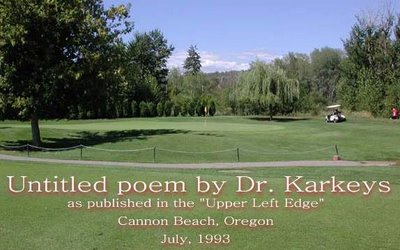 We mostly live in little wooden boxes. Outside the boxes there
We mostly live in little wooden boxes. Outside the boxes thereare birds. We go outside and watch them. They excite us and lift
our spirits.
The boxes we live in are made of fir and hemlock, of oak and
cedar and sheetrock. We build windows in them so they will not
be so dark, and so that we can see the birds.
Sometimes we feed them, when the weather is harsh, or when the
plants they eat are not permitted to grow, or the insects they
would feed upon are poisoned instead.
We enjoy the birds so much that we build them little boxes to nest
in, and we place the boxes near the windows in our homes. They
would live near us anyway, except that we usually saw down the firs
and hemlocks and cedars they would live in.
Taking the trees this way is called logging, as the taking of whales
is called whaling. When all the trees within reach are taken, as a
drift net takes everything it reaches in the sea, it is called clear
cutting. It is said to resemble the effect of a forest fire, except
that we then apply herbicides and pesticides so that nothing will
grow but a single conifer species.
The rains wash these poisons along with the wondrous soil from the
hillsides, trickling and splashing into the creek, altering it
physically and chemically so that fewer fish are inclined to call it
home. So many of the spawning grounds have been lost that there are
many more ghost salmon than live ones.
We believe the water is safe, and we take it from the creek to drink
and to cook with and bathe in and to wash our cars. We also sprinkle
it on patches of grass called lawns, which we maintain at a fixed
height, lest it cause unrest. We inherited this custom from the
English. Very, very large lawns are called golf courses, and we
inherited them from the Scots. Some radical thinkers believe that the
only patriotic place for this kind of grass is on a baseball field, an
American invention.
The number of people who watch baseball is a very small fraction of
those who watch birds. Worldwide, there are more birdwatchers than
afficiandi
understand them, the birds gave us guidance and wisdom. Now we avidly watch their comings and goings and try to touch the lost thread between us and them, like forlorn lovers waiting for the phone to ring.
The ravens would tell us about the water, if we could understand them, but we already know, and that is what is amazing. We already know, and some of us don't care.

1 comment:
"We already know, and some of us don't care."
I'm just glad to know some of those who DO care. We watched 3 yellow finches flitting in an oak tree yesterday. They were amazingly busy ... sharpening their beaks on the branches, cracking the last little acorns, just a study in motion & joyful activity.
Thank you for saving this (for 13 long yrs!!!) & reminding us to watch it all while we can. ~~ D.K.
Post a Comment